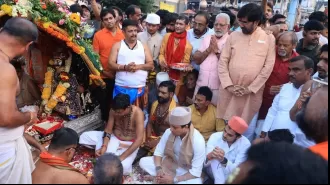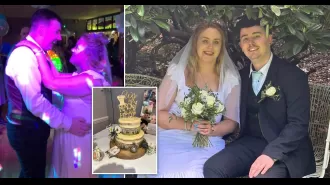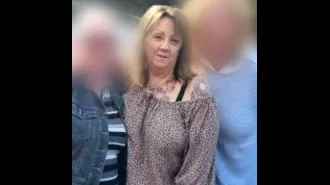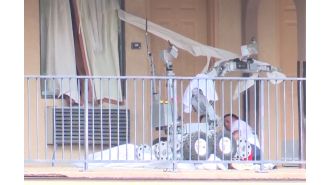BBC's ratings declined on election night due to hosts Laura Kuenssberg and Clive Myrie, according to viewers' theories.
Presenter's decision is being doubted.
July 9th 2024.
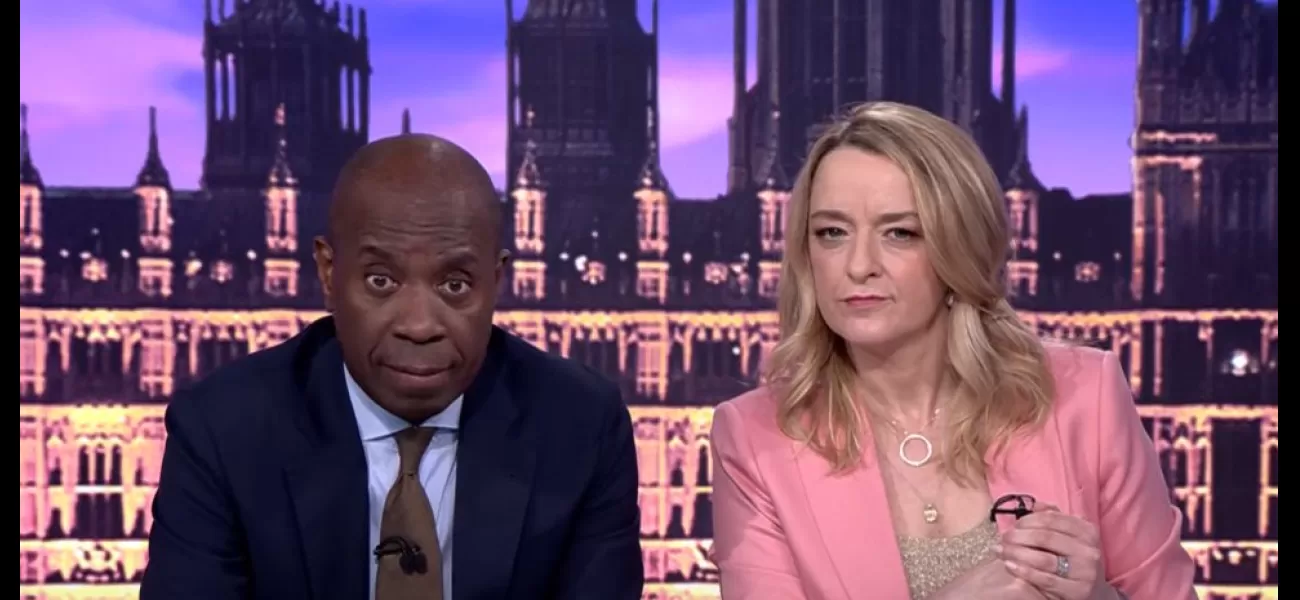
The BBC has experienced a decrease in ratings during their coverage of the recent general election, leaving many wondering what may have caused the drop. This decline has resulted in two million fewer viewers compared to 2019, a significant decrease that has raised eyebrows among the audience. It seems that the corporation's specialized programming, which followed the unfolding political events, did not attract as many viewers as it did in previous years.
Despite this drop, the BBC still remained the most-watched channel during the election, with 4.2 million viewers tuning in between 10pm and 11pm on July 4. However, this was a noticeable decrease from the 6.1 million viewers they had in the last general election. It is worth noting that the Labour win was watched by a combined 7.3 million viewers across all channels, indicating a potential shift in audience habits.
Five years ago, it was Huw Edwards who led the coverage, but this time, it was Laura Kuenssberg and Clive Myrie who shared the responsibility. While some may have enjoyed their presence, not everyone was pleased with the choice of presenters. In fact, some viewers have pointed to the presenter choice as a possible reason for the decline in ratings.
There were criticisms about the BBC's presenter choice, with some viewers expressing their disappointment. For instance, David Todd wrote on X, "I like both Clive Myrie and Laura K, but their election night gig was not great. It started off talking about nothing and then it missed half the results." Similarly, Bob Mitchell also had thoughts on the presenter choice, stating, "I was one of those viewers who switched off the BBC election coverage, and it was definitely not because of Clive Myrie. The BBC seriously needs to consider replacing Kuenssberg, as her political allegiance is blatantly obvious, and what she said to Ed Davey was unacceptable."
Kuenssberg has faced criticism for her political bias and her comments on her Sunday politics show, where she introduced the Liberal Democrats leader by saying, "Ed Davey, congratulations, I suppose, on your more than 70 seats." This drew backlash from viewers, including Carol Vorderman, who suggested that BBC journalist Victoria Derbyshire should replace Kuenssberg. Vorderman tweeted on X, "Time for #bbclaurak to become #bbcVictoriaD don't you think? @vicderbyshire Quite extraordinary. Vic D is exceptional and gives them all a hard time if that is what's needed. She knows her detail and cuts through with any bias. BBC is lucky to have her."
Not everyone was happy with the coverage, with some viewers criticizing Kuenssberg's presence on the show. Lesley Smith wrote on general election night, "Even with Channel 4's inexplicable panel choice - Nadine Dorries, cough - it was infinitely better than listening to Kuenssberg. Even Clive Myrie didn't cut through the toxicity of her sycophantic coverage." Similarly, another viewer wrote, "@BBCNews you finally have a good reason to fire her for cause. Unbalanced coverage." Another viewer, Chris Curtis, concluded, "Watching a bit of the election coverage. Laura Kuenssberg and Clive Myrie are poles apart. Could listen to Clive all night, but Kuenssberg speaks to everyone with contempt."
Sue Priest expressed her disappointment, stating, "I would have stuck with the Beeb if it had been just Clive. But I am struggling to bear Laura these days. Sorry, but she just comes across as biased - putting the knife in to non-Cons, especially Labour. She even made a barbed comment to lovely Ed Davey after their huge success." Meanwhile, Matt Page hopes that the ratings send a clear message to the BBC.
Before the show even aired, some viewers had already expressed their intention to boycott the coverage due to their belief that Kuenssberg was not impartial. However, the BBC continued with their coverage throughout the night and the following day, as votes continued to be counted and results were confirmed. The broadcaster averaged at 2.9 million viewers, with 11.9 million tuning in for at least 3 minutes up to 2am. In fact, their statistics show that 80% of UK adults turned to the BBC for the election results.
Other channels also provided coverage, such as ITV1, which had 836,000 viewers. Tom Bradby, who has previously anchored election nights, once again led ITV's coverage. However, ITV saw a decrease in viewers from the last election, with 1 million fewer viewers tuning in for the 10pm hour for the exit poll results.
Channel 4 took a different approach to their coverage and was able to double their ratings, with a peak of 1.1 million viewers. Krishnan Guru-Murthy and Emily Maitlis hosted "Britain Decides" with "The Rest is Politics" and "Gogglebox" as part of the alternative coverage. Podcast hosts Alastair Campbell and Rory Stewart provided commentary, while guests such as former Tory MP Nadine Dorries and Carol Vorderman popped in during the episode.
Other channels, including Sky News, BBC News, and GB News, also contributed to the overall viewership for the election results. It remains to be seen what the BBC will do in response to the drop in ratings and the criticisms raised by viewers.
Despite this drop, the BBC still remained the most-watched channel during the election, with 4.2 million viewers tuning in between 10pm and 11pm on July 4. However, this was a noticeable decrease from the 6.1 million viewers they had in the last general election. It is worth noting that the Labour win was watched by a combined 7.3 million viewers across all channels, indicating a potential shift in audience habits.
Five years ago, it was Huw Edwards who led the coverage, but this time, it was Laura Kuenssberg and Clive Myrie who shared the responsibility. While some may have enjoyed their presence, not everyone was pleased with the choice of presenters. In fact, some viewers have pointed to the presenter choice as a possible reason for the decline in ratings.
There were criticisms about the BBC's presenter choice, with some viewers expressing their disappointment. For instance, David Todd wrote on X, "I like both Clive Myrie and Laura K, but their election night gig was not great. It started off talking about nothing and then it missed half the results." Similarly, Bob Mitchell also had thoughts on the presenter choice, stating, "I was one of those viewers who switched off the BBC election coverage, and it was definitely not because of Clive Myrie. The BBC seriously needs to consider replacing Kuenssberg, as her political allegiance is blatantly obvious, and what she said to Ed Davey was unacceptable."
Kuenssberg has faced criticism for her political bias and her comments on her Sunday politics show, where she introduced the Liberal Democrats leader by saying, "Ed Davey, congratulations, I suppose, on your more than 70 seats." This drew backlash from viewers, including Carol Vorderman, who suggested that BBC journalist Victoria Derbyshire should replace Kuenssberg. Vorderman tweeted on X, "Time for #bbclaurak to become #bbcVictoriaD don't you think? @vicderbyshire Quite extraordinary. Vic D is exceptional and gives them all a hard time if that is what's needed. She knows her detail and cuts through with any bias. BBC is lucky to have her."
Not everyone was happy with the coverage, with some viewers criticizing Kuenssberg's presence on the show. Lesley Smith wrote on general election night, "Even with Channel 4's inexplicable panel choice - Nadine Dorries, cough - it was infinitely better than listening to Kuenssberg. Even Clive Myrie didn't cut through the toxicity of her sycophantic coverage." Similarly, another viewer wrote, "@BBCNews you finally have a good reason to fire her for cause. Unbalanced coverage." Another viewer, Chris Curtis, concluded, "Watching a bit of the election coverage. Laura Kuenssberg and Clive Myrie are poles apart. Could listen to Clive all night, but Kuenssberg speaks to everyone with contempt."
Sue Priest expressed her disappointment, stating, "I would have stuck with the Beeb if it had been just Clive. But I am struggling to bear Laura these days. Sorry, but she just comes across as biased - putting the knife in to non-Cons, especially Labour. She even made a barbed comment to lovely Ed Davey after their huge success." Meanwhile, Matt Page hopes that the ratings send a clear message to the BBC.
Before the show even aired, some viewers had already expressed their intention to boycott the coverage due to their belief that Kuenssberg was not impartial. However, the BBC continued with their coverage throughout the night and the following day, as votes continued to be counted and results were confirmed. The broadcaster averaged at 2.9 million viewers, with 11.9 million tuning in for at least 3 minutes up to 2am. In fact, their statistics show that 80% of UK adults turned to the BBC for the election results.
Other channels also provided coverage, such as ITV1, which had 836,000 viewers. Tom Bradby, who has previously anchored election nights, once again led ITV's coverage. However, ITV saw a decrease in viewers from the last election, with 1 million fewer viewers tuning in for the 10pm hour for the exit poll results.
Channel 4 took a different approach to their coverage and was able to double their ratings, with a peak of 1.1 million viewers. Krishnan Guru-Murthy and Emily Maitlis hosted "Britain Decides" with "The Rest is Politics" and "Gogglebox" as part of the alternative coverage. Podcast hosts Alastair Campbell and Rory Stewart provided commentary, while guests such as former Tory MP Nadine Dorries and Carol Vorderman popped in during the episode.
Other channels, including Sky News, BBC News, and GB News, also contributed to the overall viewership for the election results. It remains to be seen what the BBC will do in response to the drop in ratings and the criticisms raised by viewers.
[This article has been trending online recently and has been generated with AI. Your feed is customized.]
[Generative AI is experimental.]
0
0
Submit Comment

